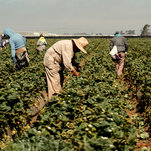
She assumes that her employer has thinned the packing lines because, with schools closed, demand for packed fruit is down. The company is also trying to prevent the spread of Covid-19
“We’re afraid of this illness. But we are more afraid that we won’t be able to make a living,” said Ms. Fabian, a single mother who bought a house in October, where she lives with her three children.
In Idaho, where on March 25 the governor implemented a statewide stay-at-home order, dairy owners are scrambling to ensure that the industry’s 8,000 workers, 90 percent of them undocumented, can keep working. Even before the virus, the industry, which needs workers year-round to milk the cows, had been grappling with a labor shortfall.
Rick Naerebout, chief executive of the Idaho Dairymen’s Association, said that he has fielded calls from many dairy farmers worried that their workers may be unable to get to work if the authorities begin enforcing domestic travel restrictions. So he has been providing members with a template to print out on official letterhead and distribute to workers, stating that they are now considered essential workers, part of the nation’s critical infrastructure.
“The fact that there is that cognitive recognition that we have to allow these individuals to travel to and from work because they are critical — that’s the complete opposite of what they’ve heard for nearly their entire lives, that they have taken away opportunities from Americans,” he said.
“At the highest level of government, now we’ve seen this be recognized. Whether it’s formal or informal, there’s this acknowledgment that, you’re OK.”
Caitlin Dickerson in New York contributed reporting.